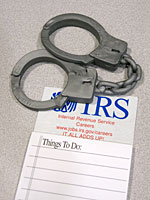When it comes to accountants, words like gun-toting, wire-tapping and working undercover don’t usually come to mind.
But as School of Management students learned recently, conducting surveillance, interrogating witnesses, combing records, even rummaging through trash are all in a day’s work for forensic accountants in the Internal Revenue Service Criminal Investigation unit.

The exercise took on an air of authenticity with law enforcement props and illegal casino items.

The students participated in the IRS’ Adrian Project, an exercise that gives students hands-on experience working with IRS special agents to solve hypothetical financial crimes using forensic accounting techniques.
The Adrian Project, held on college campuses nationwide since it was piloted at Adrian College in Michigan in 2002, also allows students to learn more about careers in governmental accounting. The UT Dallas Center for Internal Auditing and the IRS collaborated to bring the project to the School of Management.
The five-hour exercise began with a briefing from Dallas IRS Criminal Investigation unit officials and special agents who teamed with faculty members to role-play the parts of informants, witnesses and criminals and coached the students, who are top scholars in the internal audit and Professional Program in Accounting programs.
“We’re going to do somewhat of a scaled-down version of what we do. You’ll do it in about four or five hours, but it really takes a couple of years to work a case from beginning to end,” Special Agent Dana Bracy of the Dallas IRS Criminal Investigation unit told the students before the the daylong exercise.
“This is probably the best opportunity you will ever have to interact with a live investigative agent, so take advantage of this chance to learn,” Bracy, who also teaches forensic accounting at UT Dallas, advised the students.
After the introduction, students were sworn in as honorary special agents and divided into five squads, each with an agent who coached them in the fine points of investigation: dealing with confidential informants; gathering evidence from sources, including a suspect’s trash; surveillance; and working with witnesses and other law enforcement agencies.
Led by their IRS coaches, the groups investigated three crime scenarios: the examination of a shady business owner hiding assets by keeping a double set of books, a business involved in money-laundering operations and a drug trafficker. The honorary special agents looked the part, too, as they donned IRS raid jackets, mock weapons and handcuffs and specially-made IRS badges.
“When the students attempted to interview faculty, who were playing the parts of criminals involved in IRS scams, it was a eye-opener for many of them as they were able to see some of the real-world difficulties you come across when you are trying to elicit information from people who may or may not be involved in criminal wrong-doing,” said Chris Linsteadt, the auditing center’s assistant director and School of Management faculty member.
“The students really learned a lot, and it was fun for the faculty as well because we were able to see our students bringing to bear real-world skills that we have talked about in the classroom,” Linsteadt said.
Full-Time MBA student Rebecca Brooks of Dallas said the Adrian Project was a wonderful exercise in deductive reasoning, understanding the limitations and freedoms of white-collar law enforcement and blending paper trails with field work.
Brooks and her team members were assigned to investigate a tax-evasion case involving a bar owner who was selling his business and keeping two sets of books, one set reporting a profitable business and the other – reported as income to the IRS – indicating low profits. After examining W-2s, bank records and conducting surveillance, the team obtained a search warrant from a “judge.”
“I learned a good deal about what is and isn’t public record, what constitutes probable cause for a warrant, how to plan for surveillance, undercover operations and serving warrants. I also learned about questioning witnesses or informants and how to get the best information from them,” Brooks said.
Because the field of internal audit has such a variety of career possibilities, Brooks said, she wanted to participate in the project to test her interest in the area of financial criminal investigation. She was impressed with the systematic approach the agents took in surveillance and serving warrants.
Accounting senior Chris Pier said he was excited to be able to put the skills learned in the classroom to test. “The Adrian Project helped show me how all of the things that I learned while going to school here the past few years fits together in the real world. I learned another aspect of what the IRS does and what people try to do to cheat the IRS,” he said.